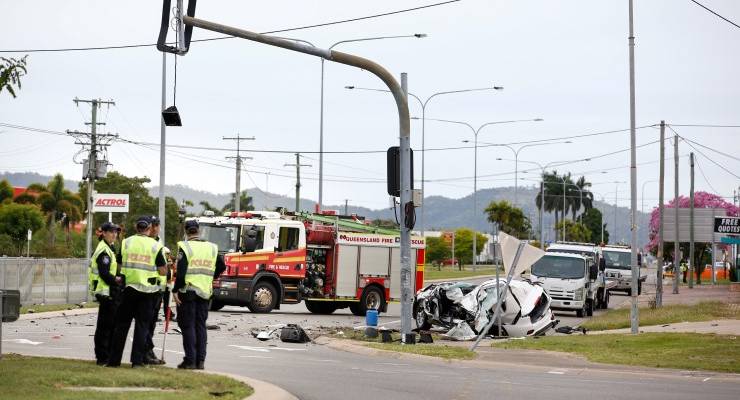
Politicians make laws all the time that make citizens culpable for negligence. Rightly so.
Drivers should understand they face severe penalties, maybe imprisonment, if their negligence causes a death on the road. Company directors should understand they face severe penalties, including imprisonment, if their negligence causes death in a workplace. And bankers should understand the severe penalties if they haven’t paid attention to transactions that might fund slavery, child exploitation or organised crime.
This is now part of the legal system. But the legislators at the top of the system get off scot-free. What if they faced the same sanctions?
Should a politician be held accountable for a bad decision in ways other than facing voters at a ballot box years later? And if company directors are liable for the behaviour of those in a company, why shouldn’t politicians be held to account better for sloppy or no decisions?
These questions are reasonable to consider after Townsville’s “youth crime” fracas, where teen crime dominates Queensland headlines, and police and court time.
It is being argued that non-action by a succession of politicians has fuelled the crime spree. Presented with options, the politicians have declined to act. People have died. Why is this different from ignoring workplace safety issues, money laundering or distracting yourself while driving?
A board member of any given company faces more than 600 state and territory laws which impose personal liability for corporate misconduct. Directors can be found liable for misconduct simply because they serve as a director. And in some states they are limited in both appeal rights and legal defences.
How does that sit with a government that is told, repeatedly, there is a problem and doesn’t act?
The youth crime issue has a head of steam in Queensland thanks to two recent incidents. First, consideration was given to charging a teen driver with the murder of an unborn child, killed when his parents were struck by an allegedly stolen car in Brisbane on January 26.
That didn’t eventuate, but the driver has been charged with the murder of the unborn child’s parents, Kate Leadbetter and Matthew Field. Police say the death of their unborn baby will be presented as “an aggravating element’’ in the murder charges.
Second, Townsville citizens are being warned not to take the law into their own hands after a stolen car was pursued by a vigilante who struck and killed 22-year-old motorcyclist Jennifer Board. The driver of that second car — following the one believed stolen — faces murder charges.
Courts are the right place for these to be settled, but the cases highlight a point about politicians and how they deal with crime issues. Before last year’s state election, voters were told there was nothing to look at in Townsville, and that curfews demanded by the state opposition and others were laughable.
Now, with a public outcry over teen crime, that same government can’t race fast enough to make top bidding in the law and order debate. Youth law breakers will soon be fitted with GPS trackers; a presumption against bail will exist in serious cases such as break and enter. Vehicle owners will be responsible for crimes unless the vehicle has been stolen; police will be given metal detectors to search juveniles for knives. The list goes on.
The arguments that such moves are unnecessary or that they target Indigenous children are being ignored by the same government that supported them before the election.
It took multiple deaths — and the public outcry — for the government to change its view. If it had overhauled its youth crime policy earlier, when locals and police and others pleaded for action, would these Queenslanders be alive?
If it was a company, not a government, at the centre of the decision-making, would someone be held accountable?
That’s not how our system works — although it’s only a matter of time before one of the multitude of commissions continually at work suggests it should.
Ask voters and most would agree, although the idea is one that would be universally condemned in the political bubble where accountability is all a one-way road.








“Company directors should understand they face severe penalties, including imprisonment, if their negligence causes death in a workplace. And bankers should understand the severe penalties if they haven’t paid attention to transactions that might fund slavery, child exploitation or organised crime.”
It seems that the worst that company directors have happen to them is to asked to step down, maybe with a reduced bonus.
In nearly 50 years of business I have never once seen a company director get any penalty for insolvent trading and I’ve seen a few bankruptcy’s in my time.
So where’s the knee-jerk legislative change creating new offences or new penalties for vigilantes, like the Townsville death driver?
Crickets.
And why believe for a second that harsh attacks on bail for young people will have any protective effect?
Crime rates have declined hugely over the last decade. Laura norder auctions continue to be arranged by monopoly press and limited media. There’s no point adding to this by writing stories talking about the unhancement of bail and criminal justice as if it would reduce crime rates that are actually in substantial long-term decline.
Why aren’t you calling for jail sentences when Politicians appoint stooges to Government positions, or they are involved in dissemination of false information, or pork barrelling grants. That would be a good start and a much better chance to get a conviction.
That sounds such an obvious process, Maroochy, but that isn’t going to happen until we have a “real” ICAC. The one this mob favour is designed to be as opaque and politician-protective as the government’s own current tactics in Parliament.
Ah but if politicians faced the consequences, who then would be a politician?.
Serious question: if it’s such a big issue, how did the people manage to keep picking leaders who did nothing? How are we voting in people who consistently fail to act on the issues?
We already have one mechanism for change that we aren’t using effectively.